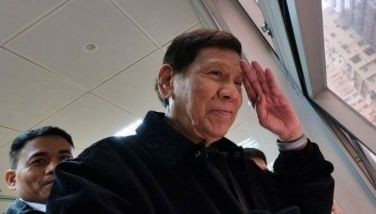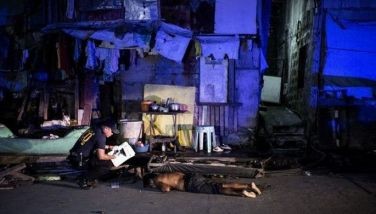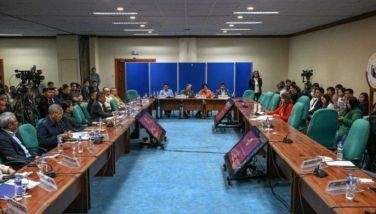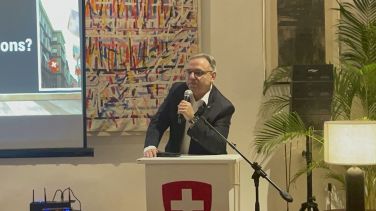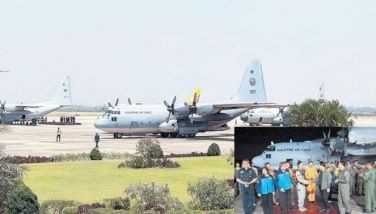Palace cool to deployment of Ebola health workers
MANILA, Philippines - Malacañang is more concerned with stopping the entry of the Ebola virus than sending Filipino health workers on a humanitarian mission to West Africa.
Speaking to reporters, Presidential Communications Operations Office Secretary Herminio Coloma Jr. said no decision has been made on sending health workers to Ebola-hit countries.
“Our thrust is to lay down defenses against Ebola and to prepare for the repatriation of our peacekeepers and workers,” he said in Filipino.
Coloma said President Aquino sees other ways of joining the global humanitarian effort to contain the spread of Ebola.
“The President has ordered the study of other ways like the giving of donation and other means of assistance,” he said in Filipino. “The priority is putting up the country’s defense (against Ebola), and to protect the health and ensure the safety of Filipinos (in Ebola-hit countries).”
Coloma said the government’s utmost concern is for Filipinos in the area of greatest peril – Sierra Leone, Guinea and Liberia.
“Our government is fully committed and firmly determined to prevent the onset or spread of the Ebola virus disease, and is undertaking all the necessary precautions and preventive measures that will protect our citizens from this disease,” he said.
“The government is undertaking all necessary measures to protect the health and well-being of our nationals or citizens in keeping with the established protocols on managing the Ebola virus disease.
“This includes: preparations for raising to level 3 the crisis alert level for the Ebola-affected countries in West Africa effective mid-November 2014.”
Level 3 entails mandatory repatriation of Filipinos from Ebola-affected countries.
A total of 1,755 Filipinos are in Ebola-stricken West Africa – 1,044 in Sierra Leone, 511 in Guinea and about 200 in Liberia (145 peacekeepers).
Peacekeepers to return home
Filipino peacekeepers will be pulled out from Liberia following the outbreak of the Ebola epidemic.
Immediately upon arrival, they will be placed on 21-day quarantine.
The soldiers are tentatively due to arrive on Nov. 10.
Armed Forces chief Gen. Gregorio Pio Catapang said the 110-strong Air Force contingent in Liberia are safe from the virus.
“Unfortunately, we cannot give them a welcome party,” he said.
Armed Forces public affairs chief Lt. Col. Harold Cabunoc said the military is currently working for the repatriation of the Filipino peacekeepers from Liberia.
“As of now, we are still looking for a suitable quarantine area that has proper and sufficient facilities that can accommodate all the 110-strong contingent,” he said.
No widespread OFW displacement
Labor Secretary Rosalinda Baldoz does not see a widespread displacement of Filipino workers when the government repatriates an estimated 2,000 from Liberia, Guinea and Sierra Leone.
“There are existing job orders that are available to Filipino workers returning from Ebola-affected countries once the government decides on mandatory repatriation,” she said. “Almost all of our workers employed in the Ebola-affected countries are engineers and other professionals and possess the skills that are highly in demand abroad.”
Recruitment agencies are closely monitoring the return of workers from Ebola-affected countries so they could fill up their existing job orders, Baldoz said.
Based on Philippine Overseas Employment Administration (POEA) data, the existing job orders are from Angola, Equitorial Guinea, South Africa, Algeria, Saudi Arabia, Qatar, United Arab Emirates, Oman, Bahrain, Malaysia, Singapore, Taiwan, Brunei, Papua New Guinea, Japan and New Zealand.
Baldoz said she has directed the POEA to discuss with employers in Ebola-affected countries the possibility of pre-terminating the contracts of Filipino workers.
“We have to settle the issue of pre-termination of contracts before the workers could be repatriated,” she said.
Baldoz said the government has no final decision yet on whether to undertake mandatory repatriation of workers from the three West African countries.
The government has three weeks to come out with a decision, she added.
Before returning, each worker must be screened for possible Ebola infection for 21 days, Baldoz said.
Their health will also be monitored for 21 days after their arrival.
Ebola-free
The Western Pacific Region, including the Philippines, remains free from the Ebola virus.
Speaking at the opening ceremony of the 65th session of the World Health Organization (WHO).
Regional Committee for the Western Pacific in Manila, Shin Young-soo, regional director for Western Pacific, said no confirmed cases of Ebola have been reported in the region “as of today.”
“But that does not mean our region is safe?“ he said.
Shin said the region has long been a hotspot for many emerging diseases, including the Severe Acute Respiratory Syndrome (SARS), the “first major disease outbreak of the 21st century.”
Shin said the Ebola virus can spread through international travel and encounter difficulties in the hands-on management of cases even in advanced countries as seen recently in the US and Spain.
“Ebola is not only a disease of the African continent,” he said. “It is an international public health emergency with significant social, economic, humanitarian, political and security dimensions.”
Shin said SARS has taught everyone the need for strong leadership, effective surveillance systems, timely and accurate reporting and rapid response.
“In the end, the SARS experience made us stronger,” he said.
Shin said many countries have the laboratory capacity to detect Ebola, and that infection prevention and control guidelines and training are being rolled out.
Command and control operations centers also exist in 85 percent of countries in the region, he added.
However, Shin said Ebola poses “a new threat to our region – one with which we have little experience. This is because the region is diverse, with big and small countries and different levels of development.”
It has huge transportation hubs, as well as vibrant trade and travel with countries worldwide, including West Africa. – With Jaime Laude, Mayen Jaymalin, Sheila Crisostomo
- Latest
- Trending



















